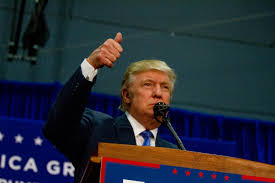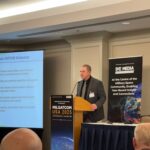http://wjla.com/news/nation-
At issue, is the legality of Trump’s revised executive order issued in March, which imposes a 90-day ban on new visa issues for citizens of Iran, Libya, Somali, Sudan, Syria and Yemen, all predominantly Muslim countries that the administration determined to be a risk to U.S. national security.
Following the implementation of the order on March 16, a federal judge in Maryland ruled in favor of a group of refugee and immigration rights groups and halted the implementation of the ban. According to the ruling by Judge Theodore Chuang, the order essentially constituted “the realization of the long-envisioned Muslim ban,” which the court believed to be discriminatory and likely unconstitutional. Chuang was able to block essential parts of the executive order from going into effect until the court considered the merits of the case.
The most compelling evidence being brought by the plaintiffs are Trump’s own statements on the campaign trail, where he discussed his plans for a “total and complete shutdown of Muslims entering the United States.” The plaintiffs are also using the botched roll-out of the first travel ban on January 27 as evidence of irregularities and possible discriminatory intent on the part of the Trump administration.
The challenge facing the White House attorney, Acting Solicitor General Jeffrey Wall, is to get the panel of 13 judges to look solely at the text of Trump’s second travel ban and its impact on national security.
Press secretary Sean Spicer told reporters on Monday that the White House has been “very consistent since the first day of the administration” that the executive order is very limited in scope and deals only with national security interests. In other words, it does not represent a Muslim ban.
According to David Martin, former deputy general counsel at the Department of Homeland Security under President Obama, the judges on the 4th Circuit are “on solid footing” in deciding to look at previous statements made by President Trump and his surrogates relating to a Muslim ban.
It is unusual to look at issues of “discriminatory intent” in cases relating to national security or immigration, where the executive branch traditionally has a lot of leeway, he explained. However, because the plaintiffs have made discrimination a key issue in blocking the travel ban, the government defense will have an especially hard time keeping prior statements out of consideration.
Earlier on Monday, Trump’s controversial statement from December 2015 calling for a complete shutdown of Muslim immigration to the United States was removed from his campaign website.
“That has certainly been an important feature in all of the rulings that have gone against these particular travel orders,” Martin explained. “That is, to use the previous statements of the president and some others who are his surrogates as a way of determining whether there was an unconstitutional intent behind issuing the order.”
If the plaintiffs seek to prove discriminatory or unconstitutional intent, then prior statements by key actors are a “legitimate element” to consider, he continued. If those statements are included, he added that the government will be “on weak grounds” to uphold the travel ban.
In Judge Chuang’s ruling in March, he cited various statements from President Trump and his surrogates as evidence of the intent behind the administration’s travel ban both before and after taking office.
On the campaign trail, Trump told news outlets that “Islam hates us,” and he insisted that an immigration ban targeting specific countries was in fact an “expansion” of his earlier call for a Muslim ban.
Chuang even referred to a Fox News interview with Trump surrogate and former New York City Mayor Rudy Giuliani, where Trump asked Giuliani to “[s]how me the right way to do it legally,” referring to the Muslim ban. Giuliani then reported advising Trump to focus on “areas of the world that create danger for us” rather than religion.
Only days after taking office, Trump made an odd insinuation upon signing the first immigration ban. Reading the title of the executive order at a press conference, Trump said, “The ‘Protection of the Nation from Foreign Terrorist Entry into the United States.’ We all know what that means.”
The International Refugee Assistance Project (IRAP), HIAS, and the Middle East Studies Association are the parties arguing against Trump’s travel ban on the basis that it violates the First Amendment of the Constitution, specially the Establishment Clause. Under the Establishment Clause, the government cannot establish an official religion, and it is forbidden from taking actions that unduly favor one religion over another.
Because of these charges, the court may be in a position where they must consider past statements by the president and his team, looking beyond just the text of the executive order, as the government defense is hoping.
According to Muzaffar Chishti, the director of the Migration Policy Institutes office at New York University School of Law, the legal precedent in cases dealing with the Establishment Clause, “has grown in the direction where … you may have an obligation to look at the evidence outside the four corners of the text.”
He noted that in this case, it may be “unreasonable for a court not to look at some statements and other pieces of evidence outside of the boundaries of the text of the law.”
Trump has already indicated he is willing to fight the opponents of his travel ban all the way to the Supreme Court. In response to the 9th District Court ruling against his first travel ban, Trump announced via Twitter, “See you in the Supreme Court!”
The 9th Circuit holds its appeals hearing dealing with Trump’s first travel ban next Monday.
The American Civil Liberties Union (ACLU) joined the legal team representing IRAP and the other plaintiffs in today’s hearing in Richmond. Manar Waheed joined the ACLU as an advocacy counsel after serving in the Obama White House as a domestic policy counsel on immigration and hate crimes. She explained that the stakes in today’s hearing are whether Trump’s travel ban remains blocked, but the ACLU will stay on the case if it progresses to Supreme Court.
“In the event that they continue to block the executive order related to the six Muslim countries, we will wait and see what the government does next and whether they want to appeal and go all the way up to the Supreme Court,” Waheed said. “We’ll take each day a step at a time and see where we land next, but I can guarantee that we will be fighting.”
Muzaffar Chishti expects the case will almost certainly reach the highest court in the land, and because of the type of case, the Court could reach a novel ruling with a totally unpredictable outcome.
“I think it’s true, the Supreme Court will be looking at an immigration question from the lens of the Establishment Clause for the first time,” he said. “And whenever you have a Supreme Court looking at anything for the first time, you have no idea how it will rule.”
In addition, Trump’s nominee to the Supreme Court, Justice Neil Gorsuch “will be a deciding vote,” and no one knows where he stands on the issue, Chishti said.
In the short course of his political career, Trump has often been able to skirt criticism of provocative statements on Twitter or at campaign rallies, but with multiple lawsuits challenging his travel ban, he may have come to the end of the line.
Asked if Trump’s words were coming back to haunt him, Martin argued that is exactly what is happening in the appeals process.
“I think it’s high time that he learn if you’re a presidential candidate or a president, your statements carry a lot of weight,” he insisted. “They’re significant and you’re going to be held accountable for them.”






